Choosing the right cryptocurrency exchange can make a big difference in your trading experience. BingX and KuCoin are two popular platforms that offer various features for crypto traders in 2025. Each has its own strengths when it comes to fees, available cryptocurrencies, and trading options.
BingX and KuCoin differ mainly in their fee structures, deposit methods, and the types of trading they support, with BingX often preferred for leverage trading while KuCoin offers a wider selection of cryptocurrencies. Understanding these differences can help you pick the exchange that best fits your trading style and needs.
When comparing these exchanges, you’ll want to consider factors like security measures, user interface, and customer support. Both platforms have loyal user bases, but your specific priorities as a trader will determine which one provides more value for your crypto journey.
BingX vs KuCoin: At A Glance Comparison
When choosing between BingX and KuCoin, you need to understand their key differences. Both platforms offer cryptocurrency trading but have distinct features that may suit different needs.
Trading Options
- BingX: Strong focus on leverage trading, copy trading features
- KuCoin: Wider variety of trading types, including spot, margin, and futures
Supported Cryptocurrencies
- BingX: Supports major cryptocurrencies but has a smaller selection
- KuCoin: Offers 700+ cryptocurrencies, including many smaller altcoins
Fee Structure
| Feature | BingX | KuCoin |
|---|---|---|
| Trading Fees | 0.1% standard | 0.1% standard |
| Withdrawal Fees | Varies by cryptocurrency | Varies by cryptocurrency |
Security Features
Both exchanges implement two-factor authentication and other security measures. KuCoin experienced a hack in 2020 but reimbursed affected users.
User Experience
BingX offers a more streamlined interface that beginners might find easier to navigate. KuCoin provides more advanced features but comes with a steeper learning curve.
Unique Selling Points
BingX stands out with its copy trading function, allowing you to mirror successful traders’ strategies. KuCoin distinguishes itself with its extensive token selection and KuCoin Shares (KCS) token that provides trading fee discounts.
Regulatory compliance varies between the platforms, with different availability depending on your location. Always check if either exchange is accessible in your country before signing up.
BingX vs KuCoin: Trading Markets, Products & Leverage Offered
Both BingX and KuCoin offer diverse trading options for crypto enthusiasts in 2025. Let’s compare what each platform provides.
Trading Markets
KuCoin supports a wider range of cryptocurrencies, with hundreds of tokens available for trading. BingX offers fewer coins but focuses on popular cryptocurrencies and emerging tokens.
Available Products
| Feature | BingX | KuCoin |
|---|---|---|
| Spot Trading | ✓ | ✓ |
| Futures/Derivatives | ✓ | ✓ |
| Copy Trading | ✓ | Limited |
| Staking | Limited | Extensive |
| Margin Trading | ✓ | ✓ |
Leverage Options
BingX provides leverage of up to 150x on certain trading pairs, making it attractive for traders seeking higher risk positions. KuCoin typically offers up to 100x leverage on futures trading.
Both platforms rank among the best crypto leverage trading platforms in 2025, alongside competitors like Binance and Bybit.
Trading Tools
KuCoin offers more advanced charting tools and technical analysis features. BingX stands out with its user-friendly social/copy trading function where you can follow successful traders.
Fee Structures
Trading fees are competitive on both platforms. KuCoin typically charges 0.1% for spot trading, while BingX fees vary by product type and user level.
You’ll find KuCoin better for accessing a wider variety of altcoins and staking options. BingX might be preferable if you’re interested in copy trading or seeking higher leverage options.
BingX vs KuCoin: Supported Cryptocurrencies
When choosing between BingX and KuCoin, the variety of available cryptocurrencies is an important factor to consider. Both exchanges offer a wide selection of digital assets, but there are notable differences.
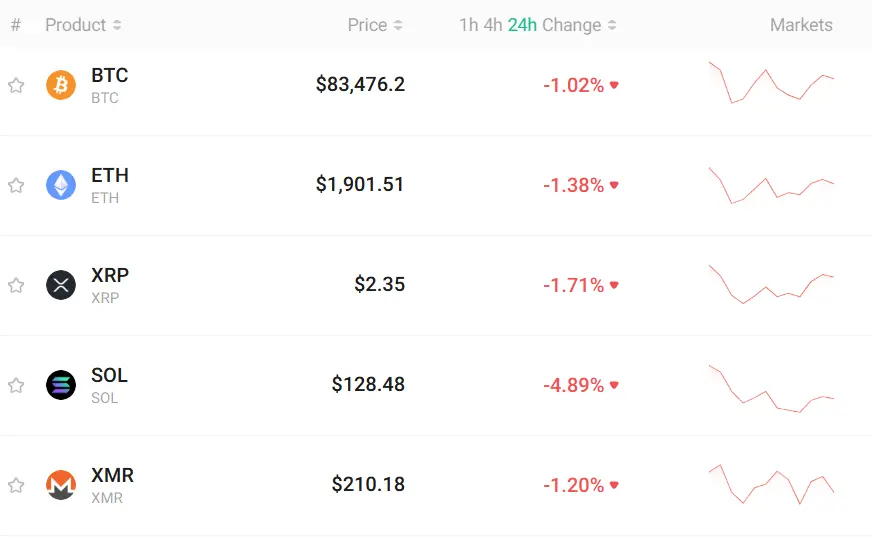
KuCoin stands out with its extensive cryptocurrency support, featuring over 700 different coins and more than 1,200 trading pairs. This makes it an excellent choice if you’re looking to trade lesser-known altcoins or emerging tokens.
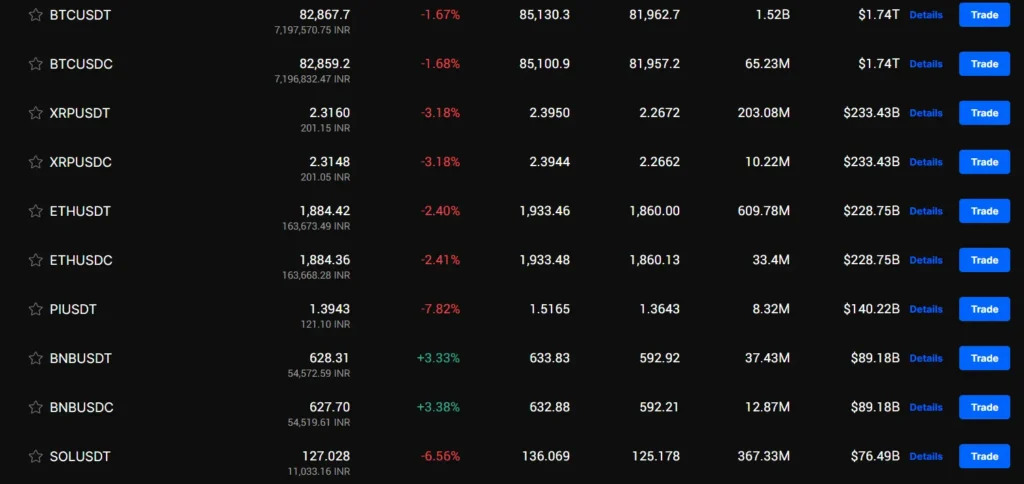
BingX offers a more focused selection with approximately 300+ cryptocurrencies. While this is fewer than KuCoin, BingX still covers all major cryptocurrencies and many popular altcoins.
Popular cryptocurrencies available on both platforms:
- Bitcoin (BTC)
- Ethereum (ETH)
- Solana (SOL)
- Cardano (ADA)
- XRP
KuCoin is often quicker to list new and emerging cryptocurrencies. This can be advantageous if you want to invest in new projects early, though these coins may carry higher risk.
BingX focuses more on established coins and tokens with proven track records. This approach may appeal to you if security and stability are your priorities.
Both exchanges regularly update their offerings, adding new cryptocurrencies as they gain popularity and market cap. You’ll find that the selection on both platforms continues to grow over time.
For traders interested in specific niche coins, checking each platform’s current listings is recommended before opening an account.
BingX vs KuCoin: Trading Fee & Deposit/Withdrawal Fee Compared
When choosing between BingX and KuCoin, understanding their fee structures is crucial for your trading strategy. Both exchanges have different approaches to trading, deposit, and withdrawal fees.
Trading Fees
| Exchange | Maker Fee | Taker Fee |
|---|---|---|
| BingX | 0.10% | 0.15% |
| KuCoin | 0.08% | 0.10% |
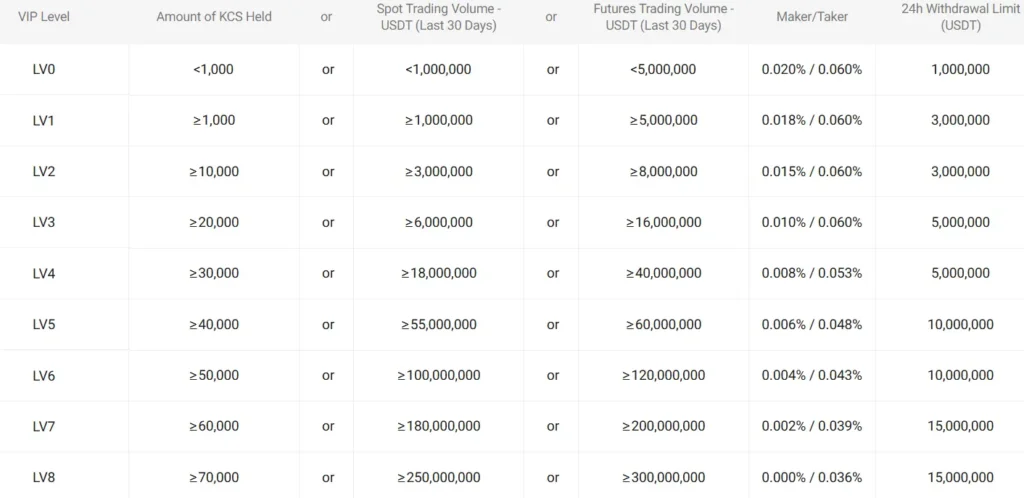
KuCoin offers slightly lower base trading fees compared to BingX. This difference can be significant if you’re a high-volume trader.
Both platforms provide fee discounts based on trading volume and native token holdings. If you hold KCS (KuCoin’s token), you can receive additional fee reductions on KuCoin.
Deposit Fees
Neither exchange typically charges for crypto deposits. This is standard across most cryptocurrency exchanges.
Withdrawal Fees
Withdrawal fees vary by cryptocurrency on both platforms. KuCoin generally has competitive withdrawal fees for most popular coins. BingX’s withdrawal fees are also coin-dependent but may differ from KuCoin’s rates.
For example, Bitcoin withdrawal fees might be lower on one platform, while Ethereum fees could be more favorable on the other.
You should check the current withdrawal fee for your specific cryptocurrencies before deciding which platform to use for larger withdrawals. These fees can sometimes change based on network conditions.
BingX vs KuCoin: Order Types
When trading on cryptocurrency exchanges, the available order types can significantly impact your trading strategy. Both BingX and KuCoin offer a variety of order options to serve different trading needs.
BingX provides standard market and limit orders for spot trading. For futures trading, it expands options to include stop-loss, take-profit, and trailing stop orders. These features help you manage risk when trading with leverage.
KuCoin offers a more comprehensive selection of order types. Besides the basic market and limit orders, you can access stop orders, post-only orders, and iceberg orders. The platform also supports OCO (One-Cancels-the-Other) orders, which let you set both take-profit and stop-loss levels simultaneously.
For margin and futures trading, KuCoin provides additional specialized order types like stop-limit orders and trailing stop orders. These give you more precise control over entry and exit points.
Both exchanges support conditional orders, but KuCoin edges ahead with more advanced trading options. This makes KuCoin potentially better suited for experienced traders who need sophisticated order execution.
BingX’s order interface is generally more straightforward, which might appeal to newer traders. The platform focuses on making common order types easily accessible.
The mobile apps for both exchanges support most order types available on their desktop platforms, allowing you to execute complex orders on the go.
BingX vs KuCoin: KYC Requirements & KYC Limits
BingX has positioned itself as one of the top non-KYC crypto exchanges in 2025. This means you can trade with minimal identity verification requirements compared to many competitors.
For BingX, basic trading functions are available without completing full KYC. However, higher withdrawal limits and additional features may require some level of verification.
KuCoin takes a more structured approach to KYC. The exchange requires you to provide personal information and verify your identity through a fully digital process.
BingX KYC Highlights:
- Minimal KYC options for certain transactions
- Trading possible with limited verification
- Higher limits require additional verification
KuCoin KYC Highlights:
- More comprehensive verification process
- Personal information required
- Digital identity verification
When comparing withdrawal limits, BingX offers more flexibility for users who prefer privacy. KuCoin’s limits are typically tied to your verification level.
The trading experience on BingX includes a user interface that many find slick and intuitive, plus responsive customer support through live chat with real people.
If KYC requirements are a primary concern for you, BingX currently offers more options for trading with minimal verification while still accessing essential features.
BingX vs KuCoin: Deposits & Withdrawal Options
Both BingX and KuCoin offer multiple options for depositing and withdrawing funds, though there are some notable differences between the platforms.
Deposit Methods
BingX supports cryptocurrency deposits as its primary method. The platform allows you to directly transfer crypto from external wallets or other exchanges.
KuCoin offers more flexibility with deposit options. You can deposit cryptocurrencies and also use third-party payment processors for fiat deposits in some regions.
Withdrawal Options
On BingX, withdrawals are primarily processed in cryptocurrency. The platform has a straightforward withdrawal process with verification steps to ensure security.
KuCoin provides cryptocurrency withdrawals to external wallets and has some limited fiat withdrawal options through third-party services, giving users more flexibility.
Fees Structure
Both exchanges charge withdrawal fees that vary by cryptocurrency. These fees are subject to market conditions and network congestion.
KuCoin’s withdrawal fees tend to be competitive within the industry, while BingX’s fees vary by asset but remain generally reasonable.
Processing Times
Crypto deposits on both platforms are typically confirmed based on blockchain network conditions. Most deposits reflect in your account after sufficient network confirmations.
Withdrawals from BingX and KuCoin usually process within minutes to hours, depending on blockchain congestion and security verification requirements.
Security Measures
Both platforms implement withdrawal address whitelisting, email confirmations, and two-factor authentication to secure your funds during the withdrawal process.
BingX vs KuCoin: Trading & Platform Experience Comparison
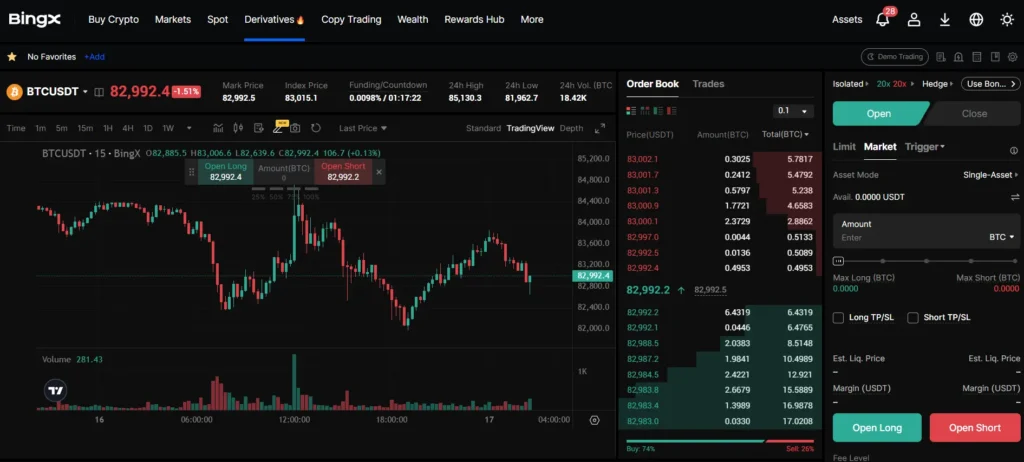
Both BingX and KuCoin offer unique trading experiences with different platform features. Let’s compare what you’ll find on each exchange.
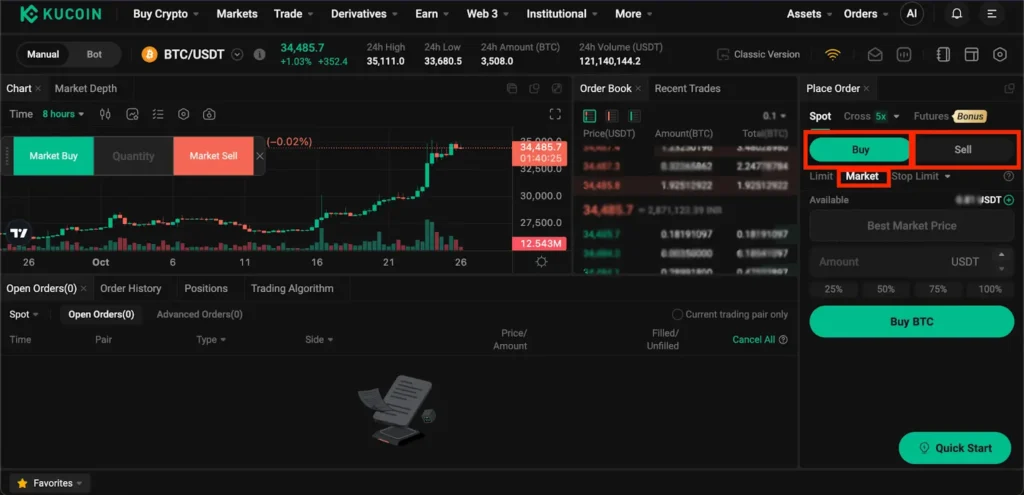
User Interface
- BingX: Clean, modern interface designed for both beginners and experienced traders
- KuCoin: Feature-rich but potentially overwhelming for newcomers
Trading Options
| Feature | BingX | KuCoin |
|---|---|---|
| Spot Trading | Yes | Yes |
| Futures/Leverage | Yes (focus on copy trading) | Yes (up to 100x) |
| New Coin Listings | Regular | Early listings of newer cryptocurrencies |
KuCoin stands out for listing newer cryptocurrencies early, making it attractive if you want to discover emerging projects before they reach larger exchanges.
BingX emphasizes its copy trading feature, allowing you to automatically mirror successful traders’ moves – perfect if you’re still learning the ropes.
Mobile Experience
Both platforms offer mobile apps with full trading capabilities. KuCoin’s app includes additional features like price alerts and market analysis tools.
Trading Fees
Trading fees are comparable between both platforms, though they vary based on your trading volume and whether you hold their native tokens.
Advanced Tools
KuCoin provides more advanced charting tools and technical analysis features for experienced traders. BingX offers a simpler experience but excels in social and copy trading functions.
Your choice ultimately depends on your trading style. Choose KuCoin for early access to new coins and advanced tools, or BingX if copy trading and a streamlined interface appeal to you.
BingX vs KuCoin: Liquidation Mechanism
When trading with leverage on cryptocurrency exchanges, understanding the liquidation mechanism is crucial for managing risk. Both BingX and KuCoin have systems in place to protect themselves when markets move against traders’ positions.
BingX uses a tiered liquidation system that gives traders warnings as their positions approach the liquidation price. You’ll receive notifications at specific margin ratio levels, allowing you time to add funds or reduce your position size.
KuCoin’s KuCoin Futures platform employs an insurance fund and auto-deleveraging mechanism. The exchange first attempts to liquidate positions at market price, but if this fails, it uses the insurance fund to cover losses.
Key differences in liquidation approaches:
| Feature | BingX | KuCoin |
|---|---|---|
| Warning system | Multiple alerts at different margin levels | Basic notification |
| Partial liquidation | Supported | Limited support |
| Insurance fund | Available | Larger insurance fund |
| Liquidation fees | 0.5% – 2% depending on asset | 0.5% – 1.5% |
BingX offers more flexible partial liquidation options, allowing you to save portions of your position during volatile market movements. This can be beneficial for preserving some capital during unexpected price swings.
KuCoin tends to have a more robust insurance fund, which may provide better protection against dramatic market moves and prevent socialized losses in extreme conditions.
Your trading style and risk tolerance should influence which liquidation mechanism better suits your needs.
BingX vs KuCoin: Insurance
When trading cryptocurrency, the security of your funds is a top priority. Both BingX and KuCoin offer insurance protections, but there are important differences to know about.
BingX maintains an insurance fund to protect users against losses during extreme market volatility. This fund helps ensure that winning traders can receive their profits even if losing traders cannot cover their losses.
KuCoin provides protection through their Safeguard Program. They allocate a portion of trading fees to build a protection fund that currently holds hundreds of millions of dollars.
Insurance Coverage Comparison:
| Feature | BingX | KuCoin |
|---|---|---|
| Insurance Fund | Yes | Yes (Safeguard Program) |
| Fund Size | Not publicly disclosed | Several hundred million USD |
| Coverage Focus | Primarily for futures trading | Platform-wide protection |
| User Compensation History | Limited public information | Has compensated users after a 2020 hack |
KuCoin has demonstrated their insurance capabilities in practice. After experiencing a major hack in 2020, they were able to recover funds and compensate affected users.
You should note that neither exchange offers FDIC-like insurance that traditional banks provide. Your crypto assets’ protection depends on each platform’s security measures and insurance funds.
Before choosing either platform, consider reviewing their most current insurance policies as they may change over time.
BingX vs KuCoin: Customer Support
When choosing a cryptocurrency exchange, reliable customer support can make a big difference in your trading experience. Both BingX and KuCoin offer support options, but they differ in several ways.
BingX provides customer support through email and live chat. Their support team works 24/7, making them accessible to users across different time zones. This round-the-clock availability can be helpful when you need urgent assistance with trading issues.
KuCoin also offers 24/7 customer service through multiple channels. You can reach their support team via email, live chat, and even through social media platforms. Many users appreciate KuCoin’s responsive support system.
Response times can vary between the two platforms. BingX generally responds quickly through their live chat feature. KuCoin might have slightly longer wait times during peak trading periods.
Both exchanges provide help centers with FAQs and guides. These resources can help you solve common problems without needing to contact support directly.
Language support is another important factor. KuCoin offers support in more languages than BingX, which might be important if English isn’t your first language.
Community support is stronger on KuCoin, with active forums and social media groups where users help each other. BingX has a growing community but isn’t as established as KuCoin’s network.
BingX vs KuCoin: Security Features
When choosing a crypto exchange, security should be your top priority. Both BingX and KuCoin offer robust security features to protect your investments.
BingX implements standard security measures including two-factor authentication (2FA) and cold storage for the majority of user funds. This helps protect your assets from potential online threats.
KuCoin, often referred to as “The People’s Exchange,” provides a comprehensive security framework. They utilize multi-factor authentication, anti-phishing codes, and trading password protection to secure your account.
Both platforms employ SSL encryption to protect data transfers and maintain regular security audits to identify vulnerabilities.
KuCoin has an advantage with its advanced risk control system that monitors unusual account activities. They also maintain up to 90% of assets in cold storage, reducing exposure to potential hacks.
BingX offers real-time monitoring and an insurance fund to protect users against potential losses. Their security team works around the clock to ensure platform safety.
Key Security Features Comparison:
| Feature | BingX | KuCoin |
|---|---|---|
| Two-Factor Authentication | ✓ | ✓ |
| Cold Storage | ✓ | ✓ (up to 90%) |
| Insurance Fund | ✓ | ✓ |
| Anti-Phishing Code | ✗ | ✓ |
| Trading Password | ✓ | ✓ |
You should enable all available security features regardless of which platform you choose. This includes using strong passwords, enabling 2FA, and regularly monitoring your account for suspicious activities.
Is BingX A Safe & Legal To Use?
BingX implements strong security measures to protect user assets. These include two-factor authentication, cold storage solutions, and advanced encryption technologies.
The platform is considered legitimate by most users and reviewers. According to search results, many users report positive experiences with BingX as a reliable cryptocurrency exchange.
BingX offers similar security features to other established exchanges, though it may not have the same global reach as platforms like Binance or Kraken.
It’s worth noting that unlike KuCoin (which experienced a major hack in 2020), there are no reports of significant security breaches at BingX in the search results provided.
The exchange provides access to numerous trading pairs and instruments, with high liquidity being one of its strengths.
Key security features:
- Two-factor authentication
- Cold storage for assets
- Encryption technologies
- Competitive security protocols
When using any crypto exchange, you should always enable all available security features and use strong, unique passwords. For maximum security, consider moving large holdings to a personal wallet when not actively trading.
Is KuCoin A Safe & Legal To Use?
KuCoin is generally considered a reputable cryptocurrency exchange, though it has experienced security issues in the past. In 2020, the platform suffered a large-scale hack, but has since strengthened its security measures.
Most of KuCoin’s funds are stored in cold storage, which adds an extra layer of protection for users. The exchange also offers advanced security features like two-factor authentication (2FA) and encryption.
For U.S. users, it’s important to note that KuCoin operates in a legal gray area. The platform does not allow U.S. citizens to complete KYC (Know Your Customer) verification, which has been the case for at least three years.
Security Features:
- Two-factor authentication (2FA)
- Encryption protocols
- Cold storage for most funds
- Micro-withdrawal wallets to split assets
Unlike some competitors, KuCoin is not regulated by major financial authorities. This lack of regulation might be concerning for some users who prioritize regulatory oversight.
When considering whether to use KuCoin, you should weigh these security measures against the platform’s regulatory status. While many users trade on KuCoin without issues, the exchange’s history of security breaches and unclear regulatory standing are factors to consider.
Your comfort level with these risks should guide your decision about using KuCoin for cryptocurrency trading.
Frequently Asked Questions
Many traders have specific questions about the differences between BingX and KuCoin when deciding which platform better suits their needs. These questions cover important aspects including fees, security features, available cryptocurrencies, trading options, and user experience.
What are the differences in trading fees between BingX and KuCoin?
BingX and KuCoin structure their fees differently. BingX typically charges between 0.1% to 0.2% per spot trade, while KuCoin’s fees start at 0.1% and decrease based on trading volume and KCS token holdings.
For futures trading, BingX’s fees range from 0.03% to 0.06% depending on the contract type. KuCoin futures trading fees are competitive at around 0.02% to 0.06% for makers and takers.
Both platforms offer fee discounts for high-volume traders, but KuCoin’s discount structure through their native token is often considered more advantageous for regular traders.
How do BingX and KuCoin compare in terms of user security measures?
Both exchanges prioritize security but implement different approaches. KuCoin offers two-factor authentication, anti-phishing codes, and trading password protection. They also maintain an insurance fund to protect users against potential losses.
BingX provides similar two-factor authentication and encrypted storage solutions. They also implement risk control systems to monitor unusual account activities and prevent unauthorized access.
KuCoin has experienced a major hack in 2020 but successfully recovered all user funds. BingX has not reported any significant security breaches to date, which some users find reassuring.
What variety of cryptocurrencies are available on BingX compared to KuCoin?
KuCoin offers a significantly larger selection with over 700 cryptocurrencies and more than 1,200 trading pairs. This makes it a preferred option for traders seeking exposure to newer, smaller-cap altcoins.
BingX supports fewer cryptocurrencies, focusing on approximately 300+ coins and major trading pairs. However, they regularly add new listings based on market demand and project quality.
Both platforms support major cryptocurrencies like Bitcoin, Ethereum, and popular altcoins, but KuCoin’s wider selection gives it an edge for diversified crypto portfolios.
Can users participate in futures trading on both BingX and KuCoin, and if so, how do they compare?
Yes, both platforms offer futures trading with some key differences. BingX provides copy trading features that allow you to follow successful traders’ strategies automatically, which is particularly helpful for beginners.
KuCoin offers up to 100x leverage on futures contracts compared to BingX’s maximum of 50x on most pairs. KuCoin also provides more advanced trading tools and chart analysis features for experienced traders.
BingX’s futures interface is generally considered more user-friendly, while KuCoin offers more sophisticated trading options and order types for experienced derivatives traders.
What are the customer support options provided by BingX versus those provided by KuCoin?
BingX offers 24/7 customer support through live chat, email, and social media channels. Their response times are generally quick, with most inquiries addressed within 24 hours.
KuCoin provides support through similar channels including live chat and email, but users sometimes report longer wait times during peak periods. They also offer an extensive knowledge base for self-service.
Both platforms provide multilingual support, but BingX tends to have more consistent response times across different languages compared to KuCoin.
How do the mobile trading experiences differ for users of BingX and KuCoin?
BingX’s mobile app focuses on simplicity with a clean interface that makes it easy to execute trades quickly. Their app particularly excels at copy trading functionality, allowing you to monitor and copy expert traders on the go.
KuCoin’s mobile app offers more comprehensive features, including futures trading, staking, lending, and access to trading bots. However, some users find the wealth of options makes the interface more complex to navigate.
Both apps provide real-time price alerts and portfolio tracking, but BingX tends to be more beginner-friendly while KuCoin offers more advanced trading tools for experienced mobile traders.
KuCoin vs BingX Conclusion: Why Not Use Both?
When comparing KuCoin and BingX, it’s clear that each platform offers unique advantages. KuCoin provides a wider selection of cryptocurrencies and has established itself as a popular exchange with robust security features.
BingX, on the other hand, focuses on creating a more user-friendly experience with an interface that may be easier for beginners to navigate.
You don’t necessarily need to choose between them. Many crypto traders use multiple exchanges to take advantage of different features, pricing, and coin availability.
Benefits of using both platforms:
- Access to more trading pairs
- Ability to compare fees for each transaction
- Reduced risk through exchange diversification
- Take advantage of unique features on each platform
KuCoin’s strength lies in its extensive coin selection, while BingX offers a smoother user experience. By using both, you can execute different types of trades on the platform best suited for each.
Remember that maintaining accounts on multiple exchanges requires managing additional security credentials. Always use strong passwords and two-factor authentication for all your crypto accounts.
Market conditions and platform features change regularly in the crypto space. You might find that having access to both KuCoin and BingX gives you more flexibility as the market evolves through 2025 and beyond.
